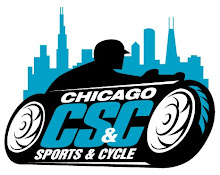Having worked the Service Counter on more than one occasion over the last 25 years, I always seem to be giving the same explanation on why Chicago Sports & Cycle doesn’t repair flat tires. Many riders believe that it is “OK” to not only repair their flat, but to consider that repair as permanent. I am of the “other” philosophy. In quoting an article from Cycle World, “repairing punctured tubeless tires poses too many unknowns to allow a comfortable margin of safety.”
When a tire suffers damage, even cleanly from a nail hole, neither the rider or repairer can be absolutely certain that there is no underlying damage to the carcass or belts. Nor can the rider or repairer be absolutely certain that the repair, whether it be plugging or sealing with liquid or foam sealant is going to hold up to the demands of high speed riding, cornering and braking. In fact, in the cases of plugging (the most common repair done in a repair facility), the repairer, in most instances, must first enlarge the hole which can tear or rip more of the carcass fabric.
So, still not convinced? Let’s look at a repair kit. When you read the instructions on the repair kit, they will state that they “usually” do a very good job at sealing the puncture, but is “usually” good enough? When you only have 2 tires and “usually” doesn’t work in your case, are you physically, mentally, and financially prepared for the “other” result.
The package also strongly recommends that you only ride at a moderate or safe speed until you have the tire replaced. So who determines what a moderate or safe speed is? And since we know that there are a lot of other factors including the individual model as well as tire design and compound, wouldn’t moderate vary from bike to bike.
Lastly, if Chicago Sports & Cycle has such a strong opinion on repairing tires, why do they sell all of those tire repair kits? Well, it’s because we know that you can get a flat at any time which can put a big damper on your party if you were riding through the desert at the time. Motorcyclist’s always seem to find the best, but most desolate roads to ride, so a flat tire at the wrong location can strand you for hours or even days. Therefore, repair kits DO have a place in our world. They serve a much needed purpose for those traveling those roads less traveled. In an emergency, these kits get you safely off of the road and to the nearest tire store. But as for them being a permanent repair, you have to decide if “usually” or “fairly good” are good enough. Are you surrounded by enough good Karma, or do you just feel lucky today?

